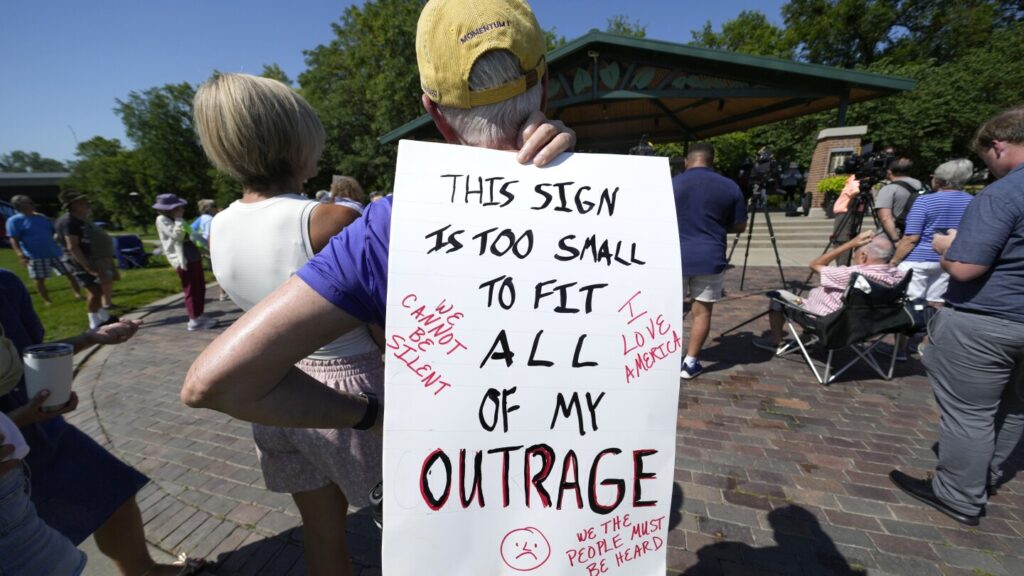
WINDSOR HEIGHTS, Iowa (AP) — President Donald Trump has hailed it as “big and beautiful,” but for many Democratic leaders, the tax break and spending cut package passed by Trump’s Republican allies in Congress on Thursday is seen as a pivotal opportunity for the Democratic Party’s resurgence. The legislation, which includes deep cuts to the nation’s safety net, has become a focal point for Democrats as they prepare for the upcoming midterm elections.
Even before the final vote was cast, Democratic officials were laying the groundwork for a series of rallies, voter registration drives, attack ads, and bus tours. These efforts aim to spotlight the most contentious aspects of Trump’s “big beautiful” bill, which, according to the nonpartisan Congressional Budget Office, will result in nearly 12 million more people losing health coverage and millions more losing food assistance.
Democratic Strategy and Challenges
In key political battlegrounds such as Alaska, Iowa, Pennsylvania, and California, Democrats are leveraging the bill to galvanize opposition against Republicans. They promise that Trump’s domestic policy achievement will be the defining issue in every major election leading up to next fall’s midterms.
“One thing is abundantly clear: Republicans own this mess and it’s an albatross around their necks heading into the midterms,” Democratic National Committee Chair Ken Martin told The Associated Press.
This is the least popular legislation in modern history, and the more voters learn about it, the more they hate it. That’s a clear directive for Democrats — we’re going to make sure every single voter knows who is responsible.
Despite favorable early public opinion, Democrats face significant hurdles. The party’s brand remains unpopular, lacking a clear leader and a cohesive message, while core elements of its base are frustrated. Additionally, some provisions of the bill will not take effect until after the 2026 election, potentially muting its immediate impact on voters.
Public Opinion and Polling Insights
Polling conducted throughout June indicates the bill’s general unpopularity, although certain provisions do have support. A Washington Post/Ipsos poll found majorities of U.S. adults favor increasing the annual child tax credit and eliminating taxes on earnings from tips. However, majorities oppose reducing federal funding for food assistance and spending on migrant detention centers.
The bill’s financial implications are also contentious.
About 6 in 10 U.S. adults in the poll said it was “unacceptable” that the bill is expected to increase the U.S. national debt, currently at $36 trillion, by about $3 trillion over the next decade.
Yet, polling suggests that most Americans are not closely following the bill’s nuances, with only about one-third of U.S. adults having heard “a great deal” or “a good amount” about it.
Grassroots Mobilization and Future Plans
The Democratic National Committee and its allies are planning an “organizing summer,” featuring town halls, training, and voter registration drives in at least 35 competitive congressional districts. The focus will be heavily on Trump’s bill, aiming to keep its contents at the forefront of voters’ minds for the midterms and beyond.
Kansas Governor Laura Kelly, who leads the Democratic Governors Association, emphasized the importance of maintaining the bill’s visibility. “We’ll just have to keep that on the radar,” she said.
Progressive groups are organizing a “Families First” day of action on July 26 across all 50 states, highlighting those affected by the new Medicaid cuts. They plan to hold a 60-hour vigil at the U.S. Capitol.
“We have made a promise to each other and to future generations that there will be a safety net in place when we need it. And this is what’s being ripped away. And people will not stand for it,”
said Ai-jen Poo, president of the National Domestic Workers Alliance.
Implications and Political Landscape
The announcement comes as Democrats acknowledge the strategic timing of the bill’s passage, coinciding with a holiday weekend when public attention may be diverted. Privately, some Democrats concede that Republicans were astute in their timing, potentially blunting immediate backlash.
As the political landscape evolves, Democrats are tasked with overcoming internal challenges and effectively communicating their message to voters. The upcoming months will be crucial as they seek to capitalize on public discontent and translate it into electoral gains.
Meanwhile, Republicans are likely to continue defending the bill as a necessary measure for economic growth, setting the stage for a contentious battle leading up to the midterms.
As the nation watches, the effectiveness of Democratic strategies and the public’s response to the bill will play a significant role in shaping the political future of the United States.







